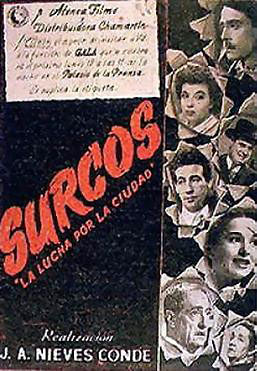Industrialization drove thousands of rural families into Spain’s big cities last century in search of money and work. The fictional story of one is told in Surcos, a 1951 neo-realist film that chronicles the grim disintegration of the Pérez clan amid the temptations and shams of a heartless Madrid.
A local screenwriter told me about Surcos at a pre-pandemic language exchange, described the film in nearly reverent tones, as if he believed that the original film canisters might be suitably interred at Valle de los Caídos in place of Franco’s coffin. So I bought the DVD. The sound quality was poor even by early fifties standards, but eventually I found out-of-sync English subtitles, and with the movie playing in one window and the subtitles text open in another was able to decipher the Spanish I couldn’t understand, like a language prof deciphering hieroglyphics.

I had to add it to my Spanish movies list. Even if a “1” for intelligible dialogue was generous, and even though some segments are guaranteed to offend modern viewers. The only other socially conscious Spanish movie I’d seen to compare with it was Santos Inocentes, and Santos Inocentes had been released a full thirty-three years later, during the democracy.
But how on earth had a controversial movie like Surcos gone live under Franco? The English Wikipedia entry credits the support of Spain’s chief of cinematography, but I didn’t judge that explanation as adequate. (Even though the support put said chief out of a job.) Gato encerrado.
Then a few months ago I bumped into the left-leaning highbrow I mentioned in my Madrid Impressions: Round Six post, and our conversation drifted to Spanish cinema. He was amazed that I’d even heard of Surcos. ‘And you saw it?!,’ he asked twice, as if hadn’t digested the first ‘yes.’
And then, as if he’d read my mind, he volunteered an answer to the mystery, or at least a major puzzle piece:
‘You know why they were able to make that movie? Because the director was Falange.’
So maybe that explained it.
The far-right Falange had been core members of the nationalist faction that had brought Franco to power. Franco owed the Falange. A socially conscious movie today embraced by many on Spain’s Left had thus come from Spain’s Right: a stern Catholic morality story, of a decent, God-fearing family brought to ruin by big city vices. I am reminded of fifteenth century painter Hieronymus Bosch (aka El Bosco at the Prado) whose nearly psychedelic depictions of hellfire would have been freewheeling even by sixties Haight-Ashbury standards. But (although little is known of his life) Bosch appears to have been a doctrinaire Catholic.
Surcos won awards, but outraged the church and many of the director’s peers. Nieves Conde discusses the personal price paid in the interview clips that begin at the twenty-one minute mark in this episode of RTVE’s Versión española.
Other titles in my Spanish films list deserve to be hollered about, but if I mention one I’ll have to mention a dozen. For Surcos, I’ll make an exception. I’m not a film buff, but I’ve seen my share of classics, the English-language movies one would expect to find on a list of ‘greatest movies of the 1950s.’ Surcos ranks alongside them, and I never would have heard of it if I hadn’t moved to Spain. It’s also a treasure of Madrid nostalgia, with scenes filmed in Lavapies, Atocha and in a vintage corrala.
I bought the Blu-Ray edition to write this post, discovered that the English subtitles dated 31/05/2018 come close to syncing with the recording, if I dial in g-650 to delay the subtitles by 650 ms in VLC. I know of no version with Spanish subtitles. RTVE has occasionally offered Surcos to viewers in Spain, but it isn’t available now, at least to my knowledge.